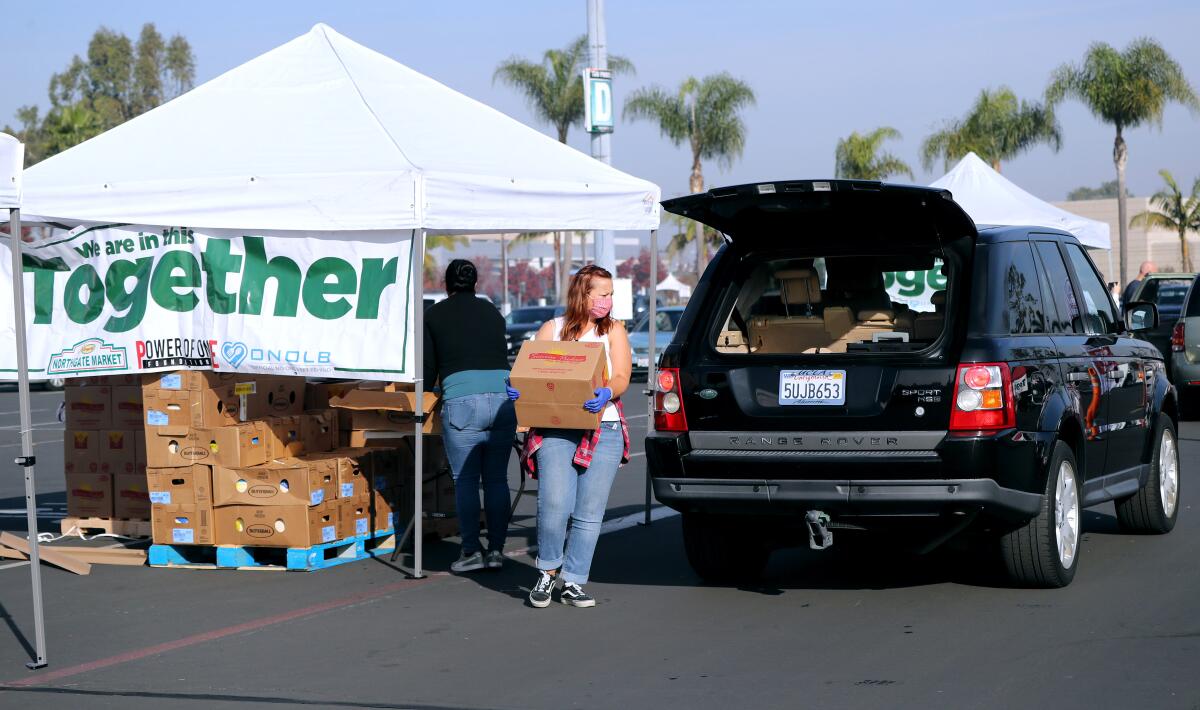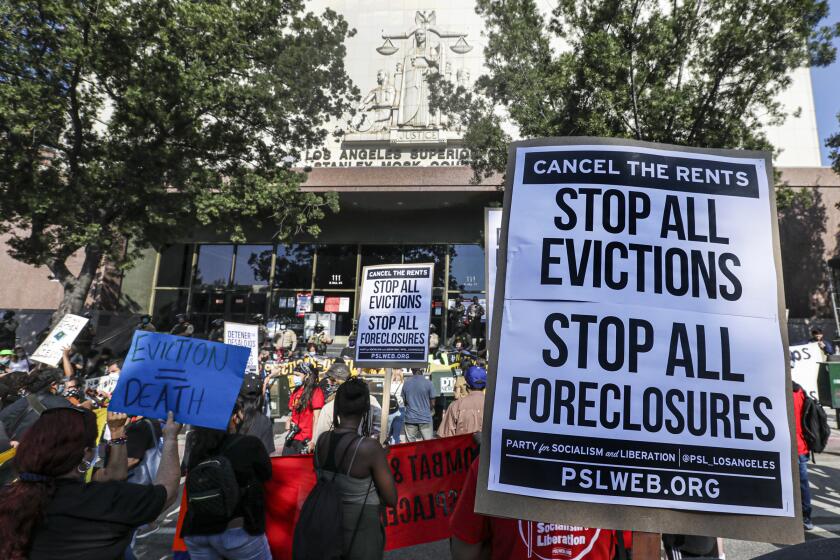New report gives yearlong snapshot of Orange County’s shifting pandemic needs

- Share via
A nonprofit that connects vulnerable people with social services and resources recently released a report that provides a picture of a full year of the pandemic and its impact on the broader needs of Orange County residents.
Findings show while request for help with basic necessities, such as food and healthcare services, predominated during the earliest months of the pandemic, housing remained the top need identified by people seeking help.
Amy Arambulo, director of community programs for the Santa Ana-based organization 211OC, explained in an interview Wednesday the impetus for reporting pandemic needs.
She said social service organizations like food pantries and work programs began to notice certain trends among their clientele when the pandemic began but didn’t have a county-level view of how requests for service were changing.
People who dial 2-1-1 for telephone assistance or who send text messages or emails requesting aid are automatically stored in a database from which trends and indicators can be tracked.
“[It’s] really a place that centralizes the need data, because we serve anyone in Orange County,” she said Wednesday. “So, we have that broader perspective.”
“Taking a Deeper Look at Community Services Provided by 211OC” compares requests for assistance received from March 2019 to March 2020 — before the effects of the pandemic began to be felt in the U.S. — to the subsequent one-year period.
The report finds the overall number of contacts made to the organization by individuals seeking help nearly doubled from the previous year, from 77,421 to 150,516. Among the most frequently cited needs were housing assistance, help with food and meals and healthcare.
Among the contacts for housing-related issues, those regarding individuals being at risk for homelessness saw an 87% increase from 2019-20 figures, while more than half of such contacts were referred to subsidized housing administrative organizations, the report indicates.
Arambulo said housing assistance requests peaked in February 2021, in part, because Orange County began offering an emergency rental assistance program and people wanted to know how to apply.
Arambulo added that 211OC “partnered with the county and other service providers to really be the front door for people to access that program. We knew it had been a need this whole time, but now there was this resource to connect folks to.”
President Biden announced an extension of eviction moratoriums, which had expired Sunday. For California renters, protections were already in place. Here’s what you need to know about expiration dates and paying rent.
The new report follows on the heels of a semiannual review released in November that provided a six-month snapshot of the pandemic’s earliest months.
The yearlong needs assessment not only shows an increase in the total number of assistance requests during the pandemic but also indicates needs have changed in the months since coronavirus first arrived in Orange County.
For example, calls from people concerned about keeping food on the table more than tripled from 2019-20, primarily because when a statewide shelter-in-place order was issued in March, many food pantries closed their doors, sending people in search of meals.
Now, in addition to housing assistance, more people are beginning to reach out for help accessing mental health and addiction resources, Arambulo said.
Social service workers are anticipating the needs will shift again, with a statewide eviction ban set to expire Sept. 30 and as the federal Lost Wages Assistance Program, which gives unemployment recipients a supplemental $300 per week, sunsets Saturday.
“We’re ramping up with our CalFresh program and making connections with the county’s CalWORKs — getting that knowledge and those resources ready for this big wave we think will be coming in,” she said.
Karen Williams, president and chief executive of 211OC, in a news release issued last week thanked the many organizations that continue to respond to the needs of residents as the pandemic stretches into its 18th month.
“It’s not an understatement to say that we heard a collective call for help from our fellow county residents as the pandemic unfolded,” Williams said. “We believe that when people are linked to resources, they do better — and when they do better, the community is stronger.”
To access 211OC, call 2-1-1, text your ZIP code to 898211 or email help@211OC.org to be put in touch with a representative.
All the latest on Orange County from Orange County.
Get our free TimesOC newsletter.
You may occasionally receive promotional content from the Daily Pilot.









